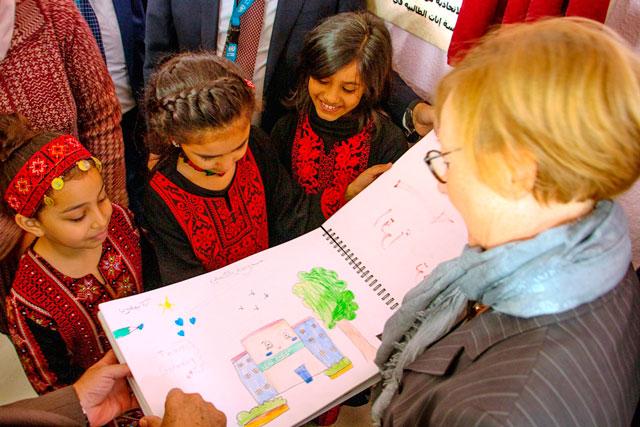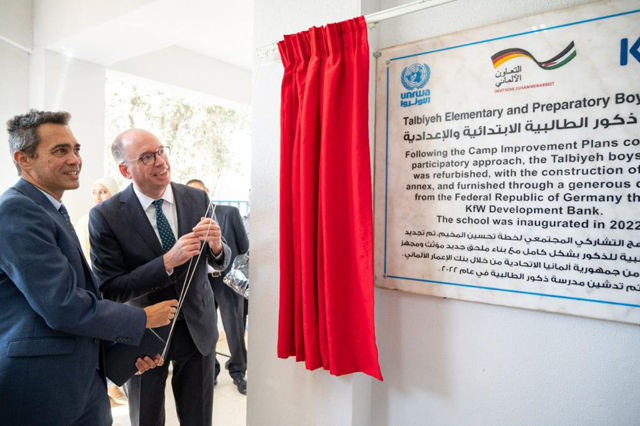You are here
BMZ representatives visit Talbieh camp for Palestinian refugees
By JT - Mar 01,2022 - Last updated at Mar 01,2022
AMMAN — Representatives from the German Federal Ministry for Economic Cooperation and Development (BMZ) on Tuesday visited Talbieh camp for Palestinian refugees to check on German-funded projects in the camp.
The delegation included the ministry’s Middle East Director Volker Oel, head of development cooperation at the German embassy in Amman Kordula Mehlhart, director of the Middle East Department of KfW Development Bank Marc Engelhardt, and country director of the German Development Agency (GIZ) Elisabeth Girrbach.
Representatives of the BMZ, KfW and the GIZ also visited the Shuafat refugee camp in the occupied Palestinian territories, according to an UNRWA statement.
The visit allowed the delegation to obtain a first-hand account of the impact of the German-funded infrastructure and camp improvement projects, as well as the German-supported education and primary health services provided by UNRWA.
Director of UNRWA Affairs in Jordan Marta Lorenzo, Rafiq Kherfan, the director general of the Department of Palestinian Affairs (DPA) and UNRWA staff accompanied the delegation, the statement reported.
“The solidarity and support that Germany shows to UNRWA are crucial to the rights and wellbeing of Palestine refugees,” Lorenzo said.
“With a focus on improving the living environment of Palestine refugees in camps through participatory planning processes and infrastructure development, supporting education and health services, including efforts to contain and combat COVID-19, and technical assistance in various areas such as mental health and social work, Germany has been a key partner in enabling UNRWA to assist Palestine refugees in Jordan,” Lorenzo said.
“Promoting development opportunities for Palestine refugees in the region and supporting UNRWA in providing mandated core services remains a priority for Germany,” Oel said.
“In our cooperation, we especially focus on strengthening participatory initiatives to ensure our support responds to the priorities of refugee communities in sustainably improving the living environment in camp settings, as well as on efforts to modernise and enhance the quality of UNRWA services through programmatic reforms and infrastructure development,” Oel added.
Since 2011, the German government has supported the sustainable improvement of living conditions in Palestine refugee camps in Jordan through KfW and the GIZ.
With the participation and empowerment of the community in the camps, over 250 shelters have been rehabilitated in the Talbieh, Husn and Jerash camps. Four schools in the Husn and Talbieh camps were refurbished and new annexes have been added, read the statement.
German support also enabled the improvement of public spaces, including an ongoing reinstatement and upgrading of Jerash camp roads and the construction of a community playground in the Husn camp.
Currently, the rehabilitation of an additional 84 shelters in the Talbieh, Husn and Jerash camps is underway, as are the upgrading of Husn playground and preparations for the construction of a photovoltaic system.
The German delegation visited refugee shelters rehabilitated with German support and met the members of the UNRWA Talbieh Girls’ School parliament to discuss their living conditions in the camp and prospects for the future.
The delegation also interacted with school counsellors to understand the psychosocial situation of students.
At the UNRWA Talbieh Health Centre, the delegation saw how health services administered through mobile applications and telemedicine limit overcrowding.
The GIZ’s support for the UNWRA staff’s mental health and psychosocial services was also highlighted, as well as the agency’s support to the Jordanian government’s national vaccination campaign.
In 2021, the German government was the UNWRA’s second-largest donor, contributing 150 million euros.
Related Articles
AMMAN — Director General of the Jordanian Department of Palestinian Affairs (DPA) Rafiq Kherfan on Sunday met Director of UNRWA Affair
AMMAN — The United Nations Relief and Works Agency for Palestine Refugees in the Near East (UNRWA) and the German embasy in Amman inaugurate
AMMAN — Niels Annen, Parliamentary State Secretary of the Federal Ministry for Economic Cooperation and Development (BMZ), and Ben Majekodun













